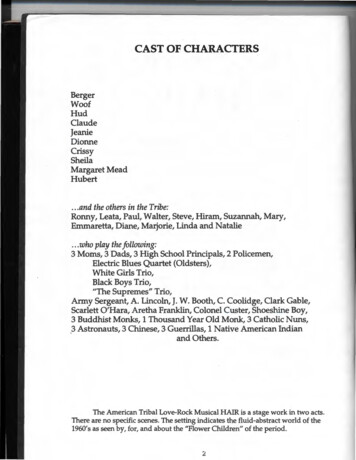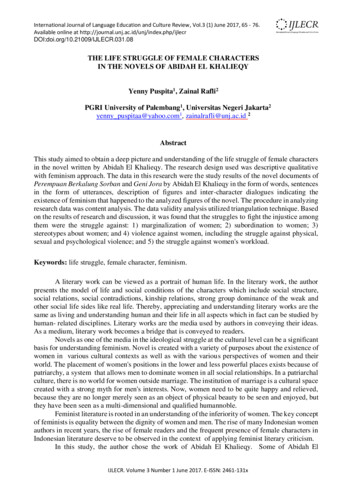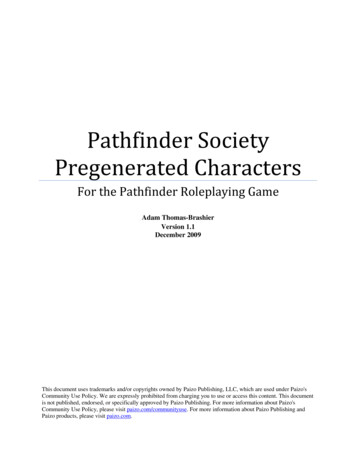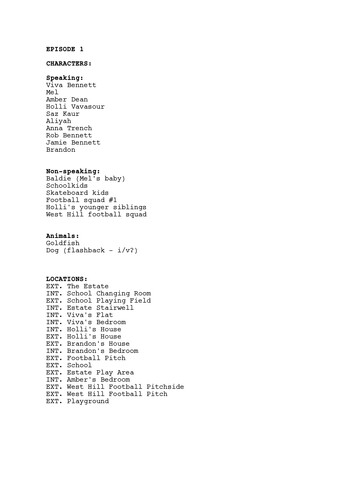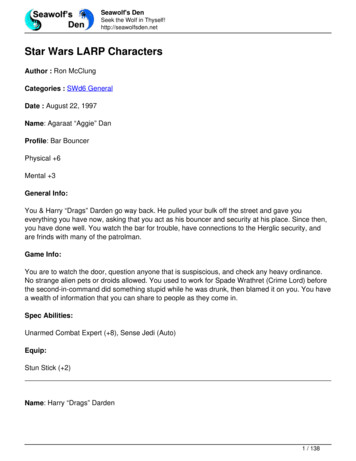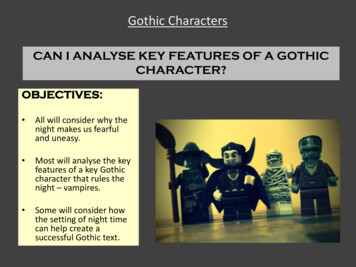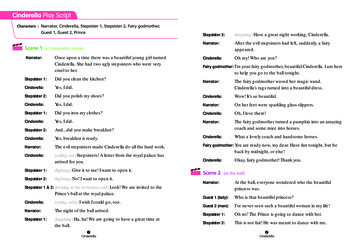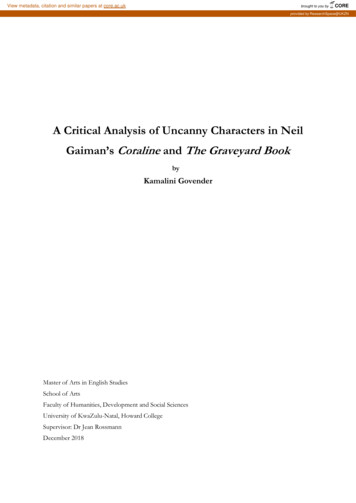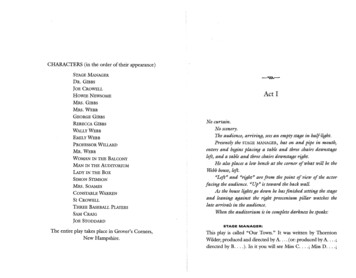
Transcription
CHARACTERS (in the order of their appearance)STAGE MANAGERDR. GIBBSJOE CROWELLAct IHOWIE NEWSOMEMRS. GIBBSMRS. WEBBGEORGE GIBBSREBECCA GIBBSWALLY WEBBEMILY WEBBPROFESSOR WILLARDMR. WEBBWOMAN IN THE BALCONYMAN IN THE AUDITORIUMLADy IN THE BoxSIMON STIMSONMRS. SOAMESCONSTABLE WARRENSI CROWELLTHREE BASEBALL PLAYERSSAM CRAIGNo curtain.No scenery.The audience) arriving) sees an empty stage in half-light.Presently the STAGE MANAGER, hat on and pipe in mouth)enters and begins placing a table and three chairs downstageleft) and a table and three chairs downstage right.He also places a low bench at the corner of what will be theWebb house) left.((Left)) and ((right)) are from the point of view of the actorfacing the audience. ((Up)) is toward the back wall.As the house lights go down he has finished setting the stageand leaning against the right proscenium pillar watches thelate arrivals in the audience.When the auditorium is in complete darkness he speaks:JOE STODDARDSTAGE MANAGER:The entire play takes place in Grover's Corners,New Hampshire.This play is called "Our TOWil." It was written by ThorntonWilder; produced and directed by A. . (or: produced by A. . ;directed by B. . ). In it you will see Miss C . ; Miss D . ;
4------ActIOur TownMiss E . ; and Mr. F. . ; Mr. G . ; Mr. H . ; and manyothers. The name of the town is Grover's Corners, NewHampshire-just across the Massachusetts line: latitude 42degrees 40 minutes; longitude 70 degrees 37 minutes. The FirstAct shows a day in our town. The day is May 7, 1901. The timeis just before dawn.A rooster crows.The sky is beginning to show some strealcs of light over in theEast there, behind our mount'in.The morning star always gets wonderful bright the minutebefore it has to go,-doesn't it?He stares at it for a moment) then goes upstage.Well, I'd better show you how our town lies. Up hereThat is: parallel with the back wall.is Main Street. Way back there is the railway station; tracks gothat way. Polish Town's across the tracks, and some Canuckfamilies.Toward the left.Over there is the Congregational Church; across the street'sthe Presbyterian.Methodist and Unitarian are over there.Baptist is down in the holla' by the river. Bryan once made a speech from these very steps here.Along here's a row of stores. Hitching posts and horse blocksin front of them. First automobile's going to come along inabout five years-belonged to Banker Cartwright, our richestcitizen . lives in the big white house up on the hill.Here's the grocery store and here's Mr. Morgan's drugstore.Most everybody in town manages to look into those twostores once a day.Public School's over yonder. High School's still farther over.Quarter of nine mornings, noontimes, and three o'clockafternoons, the hull town can hear the yelling and screamingfrom those schoolyards.He approaches the table and chairs downstage right.This is our doctor's house,-Doc Gibbs'. This is the back door.Two arched trellises) covered with vines and flowers) .arepushed out) one by each proscenium pillar.There's some scenery for those who think they have to havescenery.This is Mrs. Gibbs' garden. Corn . peas . beans . hollyhocks . heliotrope . and a lot ofburdoclc.Crosses the stage.In those days our newspaper come out twice a weelc-theGrover's Corners Sentinel-and this is Editor Webb's house.Catholic Church is over beyond the tracks.And this is Mrs. Webb's garden.Here's the Town Hall and Post Office combined; jail's in thebasement.5Just lilce Mrs. Gibbs', only it's got a lot of sunflowers, too.
6 OurTownHe looks upward) center stage.Right here . 's a big butternut tree.He returns to his place by the right proscenium pillar andlooks at the audience for a minute.ActI 7a plump) pleasant woman in the middle thirties)comes cCdownstairS» right. She pulls up an imaginary windowshade in her kitchen and starts to make a fire in her stove.MRS. GIBBS,Doc Gibbs died in 1930. The new hospital's named after him.The earliest tombstones in the cemetery up there on themountain say 1670-1680-they're Grovers and Cartwrightsand Gibbses and Herseys-same names as are around herenow.Mrs. Gibbs died first-long time ago, in fact. She went out tovisit her daughter, Rebecca, who married an insurance man inCanton, Ohio, and died there-pneumonia-but her body wasbrought back here. She's up in the cemetery there now-inwith a whole mess of Gibbses and Herseys-she was JuliaHersey 'fore she married Doc Gibbs in the CongregationalChurch over there.Well, as I said: it's about dawn.In our town we like to know the facts about everybody.The only lights on in town are in a cottage over by the trackswhere a Polish mother's just had twins. And in the Joe Crowell house, where Joe Junior's getting up so as to deliver thepaper. And in the depot, where Shorty Hawkins is gettin'ready to flag the 5 :45 for Boston.There's Mrs. Webb, corning downstairs to get her breakfast,too.Nice town, y'know what I mean?Nobody very remarkable ever come out of it, s'far as we know.A train whistle is heard. The STAGE MANAGER takes out hiswatch and nods.Naturally, out in the country-all around-there've been lightson for some time, what with millcin's and so on. But town people sleep late.So-another day's begun.There's Doc Gibbs comin' down Main Street now, comin' backfrom that baby case. And here's his wife cornin' downstairs toget breakfast.-That's Doc Gibbs. Got that call at half past one this morning.And there comes Joe Crowell, Jr., delivering Mr. Webb's Sentinel.DR. GIBBS has been coming along Main Street from the left.At the point where he would turn to approach his house) hestops) sets down his--imaginary-black bag) takes offhis hat)and rubs his face with fatigue) using an enormoushandkerchiefa thin) serious) crisp woman) has entered herkitchen) left) tying on an apron. She goes through the motionsofputting wood into a stove) lighting it) and preparingbreakfast.MRS. WEBB,
8 Our TownSuddenly, JOE CROWELL, JR., eleven, starts down Main Streetfrom the right, hurling imaginary newspapers into doorways.,JOE CROWELL, ,JR.:Act I 9,JOE CROWELL, ,JR.:Fine, Doc, I never think about it at all. Only like you said, italways tells me when it's going to rain.Morning, Doc Gibbs.DR. GIBBS:DR. GIBBS:. What's it telling you today? Goin' to rain?Morning, Joe.,JOE CROWELL, ,JR.:,JOE CROWELL, ,JR.:Somebody been sick, Doc?No, sir.DR. GIBBS:DR. GIBBS:No. Just some twins born over in Polish Town.Sure?,JOE CROWELL, ,JR.:,JOE CROWELL, ,JR.:Do you want your paper now?Yessir.DR. GIBBS:DR. GIBBS:Yes, I'll take it.-Anything serious goin' on in the world sinceWednesday?Knee ever make a mistake?,JOE CROWELL, ,JR.:,JOE CROWELL, ,JR.:Yessir. My schoolteacher, Miss Foster, 's getting married to afella over in Concord.DR. GIBBS:I declare.-How do you boys feel about that?No, sir.JOE goesoff. DR. GIBBS stands reading his paper.STAGE MANAGER:Want to tell you something about that boy Joe Crowell there.Joe was awful bright-graduated from high school here, head,JOE CROWELL, ,JR.:Well, of course, it's none of my business-but I think if a person starts out to be a teacher, she ought to stay one.of his class. So he got a scholarship to Massachusetts Tech.Graduated head of his class there, too. It was all wrote up in theBoston paper at the time. Goin' to be a great engineer, Joe was,DR. GIBBS:How's your knee, Joe?But the war broke out and he died in France.-All that education for nothing.
10 Act!OurTownGiddap, Bessie! What's the matter with you today?STAGE MANAGER:IIDR. GIBBS:HOWIE NEWSOME:Offleft· Hello Bessie.He strokes the horse) which has remained up center.How old is she, Howie?Here comes Howie Newsome, deliverin' the milk.HOWIE NEWSOME:about thirty) in overalls) comes alongMain Street from the left) walking beside an invisible horseand wagon and carrying an imaginary rack with milkbottles. The sound of clinking milk bottles is heard. He leavessome bottles at Mrs. WebbYs trellis) then) crossing the stage toMrs. Gibbs)) he stops center to talk to Dr. Gibbs.HOWIE NEWSOME,Going on seventeen. Bessie's all mixed up about the route eversince the Lockharts stopped talcin' their quart of mille every day.She wants to leave 'em a quart just the same-keeps scoldingme the hull trip.He reaches Mrs. Gibbs) back door. She is waiting for him.HOWIE NEWSOME:Morning, Doc.MRS. GIBBS:Good morning, Howie.DR. GIBBS:Morning, Howie.HOWIE NEWSOME:Morning, Mrs. Gibbs. Doc's just comin' down the street.HOWIE NEWSOME:Somebody sick?MRS. GIBBS:Is he? Seems like you're late today.DR. GIBBS:Pair of twins over to Mrs. Goruslawski's.HOWIE NEWSOME:HOWIE NEWSOME:Yes. Somep'n went wrong with the separator. Don't knowwhat 'twas.Twins, eh? This town's gettin' bigger every year.He passes Dr. Gibbs up center.DR. GIBBS:Goin' to rain, Howie?Doc!DR. GIBBS:HOWIE NEWSOME:No, no. Fine day-that'll burn through. Come on, Bessie.Howie!
12---.-Act IOur TownMRS. GIBBS:Calling upstairs.Children! Children! Time to get up.HOWIE NEWSOME:Come on, Bessie!He goes off right.MRS. GIBBS:George! Rebecca!arrives at his back door and passes through thetrellis into his house.DR. GIBBSMRS. GIBBS:Everything all right, Frank?Emileeee! Time to get up! Wally! Seven o'clock!MRS. GIBBS:I declare, you got to speak to George. Seems like something'scome over him lately. He's no help to me at all. I can't even gethim to cut me some wood.DR. GIBBS:Washing and drying his hands at the sink. MRS. GIBBS is b14SYat the stove.Is he sassy to you MRS. GIBBS:No. He just whines! All he thinks about is that baseballGeorge! Rebecca! You'll be late for school.DR. GIBBS:M-m-m .MRS. GIBBS:MRS. GIBBS:Bacon'll be ready in a minute. Set down and drink your coffee.You can catch a couple hours' sleep this morning, can't you?DR. GIBBS:Hm! . Mrs. Wentworth's coming at eleven. Guess I knowwhat it's about, too. Her stummick ain't what it ought to be.MRS. GIBBS:All told, you won't get more'n three hours' sleep. Frank Gibbs,I don't know what's goin' to become of you. I do wish I couldget you to go away someplace and take a rest. I think it woulddo you good.13MRS. WEBB:DR. GIBBS:Yes. I declare-easy as kittens.---.-George!DR. GIBBS:George, look sharp!GEORGE'S VOICE:Yes, PalDR. GIBBS:As hegoes off the stage.Don't you hear your mother calling you I guess I'll goupstairs and·get forty winks.
14 Our TownMRS. WEBB:Walleee! Emileee! You'll be late for school! Walleee! You washyourself good or I'll come up and do it myself.Act! 15STAGE MANAGER:We've got a factory in our town" too-hear it? Makes blankets. Cartwrights own it and it brung 'em a fortune.REBECCA GIBBS' VOICE:Ma! What dress shall I wear?MRS. GIBBS:Don't make a noise. Your father's been out all night and needshis sleep. I washed and ironed the blue gingham for you special.MRS. WEBB:Children! Now I won't have it. Breakfast is just as good as anyother meal and I won't have you gobbling like wolves. It'llstunt your growth,-that's a fact. Put away your book, Wally.WALLY:REBECCA:Aw, Ma! By ten o'clock I got to know all about Canada.Ma, I hate that dress.MRS. WEBB:MRS. GIBBS:Oh, hush-up-with-you.REBECCA:Every day I go to school dressed like a sick turkey.MRS. GIBBS:Now, Rebecca, you always look very nice.REBECCA:You know the rule's well as I do-no books at table. As for me,I'd rather have my children healthy than bright.EMILY:I'm both, Mama: you know I am. I'm the brightest girl inschool for my age. I have a wonderful memory.MRS. WEBB:Eat your brealcfast.Mama, George's thfowing soap at me.WALLY:MRS. GIBBS:I'm bright, too, when I'm looking at my stamp collection.I'll come and slap the both ofyou,-that's what I'll do.MRS. GIBBS:A factory whistle sounds.The CHILDREN dash in and take their places at the tables.Right, GEORGE, about sixteen) and REBECCA, eleven. Left,EMILY and WALLY, same ages. They carry strapped schoolbooks.I'll speak to your father about it when he's rested. Seems tome twenty-five cents a week's enough for a boy your age. Ideclare I don't know how you spend it all.GEORGE:Aw, Ma,-I gotta lotta things to buy.
16--'G.V-Our TownAct IMRS. GIBBS:Strawberry phosphates-that's what you spend it on.GEORGE:I don't see how Rebecca comes to have so much money. Shehas more'n a dollar. 17MRS. GIBBS:Tell Miss Foster I send her my best congratulations-can youremember that?REBECCA:Yes, Ma.REBECCA:MRS. GIBBS:Spoon in mouth) dreamily.You look real nice, Rebecca. Pick up your feet.I've been saving it up gradual.ALL:MRS. GIBBS:Well, dear, I think it's a good thing to spend some every nowand then.Good-by.MRS. GIBBSfills her apron with food for the chickens andcomes down to the footlights.REBECCA:Mama, do you know what I love most in the world--do you?Money.MRS. GIBBS:MRS. GIBBS:Here, chicle, chicle, chicleNo, go away, you. Go away.Eat your breakfast.Here, chicle, chicle, chicleTHE CHILDREN:Mama, there's first belL-I gotta hurry.-I don't want anymore.-I gotta hurry.The CHILDREN rise) seize their books and dash out through thetrellises. They meet) down center, and chattering) walk toMain Street, then turn left.The STAGE MANAGER goes off, unobtrusively) right.MRS. WEBB:Walk fast, but you don't have to run. Wally, pull up yourpants at the knee. Stand up straight, Emily.What's the matter with you? Fight, fight, fight,-that's allyou do.Hm . you don't belong to me. Where'd you come from?She shakes her apron.Oh, don't be so scared. Nobody's goingto hurt you.MRS. WEBBis sitting on the bench by her trellis) stringingbeans.Good morning, Myrtle. How'syour cold?
ActI18 19Our TownMRS. WEBB:MRS. WEBB:Well, I still get that tickling feeling in my throat. I told CharlesI didn't know as I'd go to choir practice tonight. Wouldn't beany use.MRS. GIBBS:Have you tried singing over your voice?MRS. WEBB:Yes, but somehow I can't do that and stay on the key. WhileI'm resting myself I thought I'd string some of these beans.No-o.MRS. GIBBS:Well, he called on me. First I thought he was a patient wantin'to see Dr. Gibbs. 'N he wormed his way into my parlor, and,Myrtle Webb, he offered me three hundred and fifty dollars forGrandmother Wentworth's highboy, as I'm sitting here!MRS. WEBB:Why, Julia Gibbs!MRS. GIBBS:MRS. GIBBS:Rolling up her sleeves as she crosses the stage for a chat.Let me help you. Beans have been good this year.MRS. WEBB:I've decided to put up forty quarts if it kills me. The childrensay they hate 'em, but I notice they're able to get 'em downall winter.Pause. Briefsound of chickens cackling.He did! That old thing! Why, it was so big I didn't knowwhere to put it and I almost give it to Cousin Hester Wilcox.MRS. WEBB:Well, you're going to take it, aren't you?MRS. GIBBS:I don't know.MRS. WEBB:You don't know-three hundred and flfty dollars! What'scome over you?MRS. GIBBS:Now, Myrtle. I've got to tell you something, because if! don'ttell somebody I'll burst.MRS. WEBB:Why, Julia Gibbs!MRS. GIBBS:Here, give me some more of those beans. Myrtle, did one ofthose secondhand-furniture men from Boston come to see youlast Friday?MRS. GIBBS:Well, if I could get the Doctor to take the money and go awaysomeplace on a real trip, I'd sell it lilce that.-Y'know, Myrtle,it's been the dream of my life to see Paris, France.-Oh, I don'tknow. It sounds crazy, J suppose, but for years I've beenpromising myself that if we ever had the chanceMRS. WEBB:How does the Doctor feel about it?
20 ActIOur TownMRS. GIBBS:Well, I did beat about the bush a little and said that if I got alegacy-that's the way I put it-I'd make him take me somewhere.MRS. WEBB:M-m-m . What did he say?MRS. GIBBS:You know how he is. I haven't heard a serious word out of himsince I've known him. No, he said, it might make him discontented with Grover's Corners to go traipsin' about Europe;better let well enough alone, he says. Every two years he malcesa trip to the battlefields of the Civil War and that's enough treatfor anybody, he says.MRS. WEBB:Well, Mr. Webb just admires the way Dr. Gibbs knows everything about the Civil War. Mr. Webb's a good mind to give upNapoleon and move over to the Civil War, only Dr. Gibbsbeing one of the greatest experts in the country just makes himdespair. 21MRS. GIBBS:Oh, I'm sorry I mentioned it. Only it seems to me that oncein your life before you die you ought to see a country wherethey don't taUc in English and don't even want to.The STAGE MANAGER enters briskly from the right. He tips hishat to the ladies) who nod their heads.STAGE MANAGER:Thanlc you, ladies. Thank you very much.MRS. GIBBSand MRS.WEBB gatherup their things) returninto their homes and disappear.Now we're going to skip a few hours.But first we want a little more information about the town,kind of a scientific account, you might say.So I've asked Professor Willard of our State University tosketch in a few details of our past history here.Is Professor Willard here?a rural savant) pince-nez on a widesatin ribbon) enters from the right with some notes in hisPROFESSOR WILLARD,MRS. GIBBS:It's a fact! Dr. Gibbs is never so happy as when he's at Antietam or Gettysburg. The times I've walked over those hills,Myrtle, stopping at every bush and pacing it all out, like wewere going to buy it.MRS. WEBB:Well, if that secondhand man's really serious about buyin' it,Julia,you sell it. And then you'll get to see Paris, all right.Just keep droppin' hints from time to time-that's how I gotto see the Atlantic Ocean, y'know.hand.May I introduce Professor Willard of our State University.A few brief notes, thank you, Professor,-unfortunatelY ourtime is limited.PROFESSOR WILLARD:Grover's Corners . let me see . Grover's Corners lies onthe old Pleistocene granite of the Appalachian range. I may sayit's some of the oldest land in the world. We're very proud of
22 Act IOurTownthat. A shelf of Devonian basalt crosses it with vestiges of Mesozoic shale, and some sandstone outcroppings; but that's allmore recent: two hundred, three hundred million years old.Some highly interesting fossils have been found . I may say:unique fossils . two miles out of town, in Silas Peckham'scow pasture. They can be seen at the museum in our Universityat any time-that is, at any reasonable time. Shall I read someof Professor Gruber's notes on the meteorological situationmean precipitation, et cetera?STAGE MANAGER:Mraid we won't have time for that, Professor. We might havea few words on the history of man here. 23PROFESSOR WILLARD:Oh, yes, indeed?-The population, at the moment) is 2,642.The Postal District brings in 507 more, making a total of3,149.-Mortality and birth rates: constant.-By MacPherson's gauge: 6.032.STAGE MANAGER:Thank you very much, Professor. We're all very much obligedto you, I'm sure.PROFESSOR WILLARD:Not at all, sir; not at all.STAGE MANAGER:This way, Professor, and thank you again.PROFESSOR WILLARD:Yes . anthropological data: Early Amerindian stock. Cotahatchee tribes . no evidence before the tenth century of thisera . . . hm . now entirely disappeared . possible traces inthree families. Migration toward the end of the seventeenthcentury of English brachiocephalic blue-eyed stock . for themost part. Since then some Slav and MediterraneanSTAGE MANAGER:And the population, Professor Willard?PROFESSOR WILLARD:Within the town limits: 2,640.STAGE MANAGER:Just a moment, Professor.He whispers into the proftssor)s ear.Exit PROFESSOR WILLARD.Now the political and social report: Editor Webb.-Oh, Mr.Webb?MRS. WEBBappears at her back door.MRS. WEBB:He'll be here in a minute . He just cut his hand while hewas eatin' an apple.STAGE MANAGER:Thank you, Mrs. Webb.MRS. WEBB:Charles! Everybody's waitin' .Exit MRS. WEBB.
24 ActIOur TownSTAGE MANAGER:Mr. Webb is Publisher and Editor of the Grover's CornersSentinel. That's our local paper, y'know.enters from his house) pulling on his coat. Hisfinger is bound in a handkerchiefMR. WEBBMR. WEBB:Well . I don't have to tell you that we're run here by a Boardof Selectmen.-Ali males vote at the age of twenty-one.Women vote indirect. We're lower middle class: sprinkling ofprofessional men . ten per cent illiterate laborers. Politically,we're eighty-six per cent Republicans; six per cent Democrats;four per cent Socialists; rest, indifferent.Religiously, we're eighty-five per cent Protestants; twelve percent Catholics; rest, indifferent.STAGE MANAGER: 25MR. WEBB:Well, ma'am, I wouldn't know what you'd call much. Satiddynights the farmhands meet down in Ellery Greenough's stableand holler some. We've got one or two town drunks, butthey're always having remorses every time an evangelist comesto town. No, ma'am, I'd say likker ain't a regular thing in thehome here, except in the medicine chest. Right good for snalcebite, y'know-always was.BELLIGERENT MAN AT BACK OF AUDITORIUM:Is there no one in town aware ofSTAGE MANAGER:Come forward, will you, where we can all hear you-Whatwere you saying?BELLIGERENT MAN:Is there no one in town aware of social injustice and industrial inequality?Have you any comments, Mr. Webb?MR. WEBB:MR. WEBB:Very ordinary town, if you ask me. Little better behaved thanmost. Probably a lot duller.But our young people here seem to like it well enough. Ninetyper cent of' em graduating from high school settle down righthere to live-even when they've been away to college.Oh, yes, everybody is-somethin' terrible. Seems like theyspend most of their time talking about who's rkh and who'spoor.BELLIGERENT MAN:Then why don't they do something about it?He withdraws without waiting for an answer.STAGE MANAGER:Now, is there anyone in the audience who would like to askEditor Webb anything about the town?WOMAN IN THE BALCONY:Is there much drinking in Grover's Corners?MR. WEBB:Well, I dunno . I guess we're all hunting like everybodyelse for a way the diligent and sensible can rise to the top andthe lazy and quarrelsome can sink to the bottom. But it ain'teasy to find. Meanwhile, we do all we can to help those that
26 Act IOur Towncan't help themselves and those that can we leave alone.Are there any other questions?LADY IN A BOX:Oh, Mr. Webb? Mr. Webb, is there any culture or love ofbeauty in Grover's Corners?MR. WEBB:Well, ma'am, there ain't much-not in the sense you mean.Come to think of it, there's some girls that play the piano atHigh School Commencement; but they ain't happy about it.No, ma'am, there isn't much culture; but maybe this is theplace to tell you that we've got a lot of pleasures of a kind here:we like the sun comin' up over the mountain in the morning,and we all notice a good deal about the birds. We pay a lot ofattention to them. And we watch the change of the seasons;yes, everybody knows about them. But those other thingsyou're right, ma'am,-there ain't much.-Robinson Crusoe andthe Bible; and Handel's "Largo," we all know that; andWhistler's "Mother"-those are just about as far as we go.LADY IN A BOX:SO I thought. Thank you, Mr. Webb. STAGE MANAGER:Thank you, Mr. Webb.MR. WEBBretires.Now, we'll go back to the town. It's early afternoon. All 2,642have had their dinners and all the dishes have been washed.having removed his coaty returns and startspushing a lawn mower to and fro beside his house.MR. WEBB,.-,--27There's an early-afternoon calm in our town: a buzzin' and ahummin' from the school buildings; only a few buggies onMain Street-the horses dozing at the hitching posts; you allremember what it's like. Doc Gibbs is in his office, tapping people and malcing them say "ah." Mr. Webb's cuttin' his la n overthere; one man in ten thinks it's a privilege to push his ownlawn mower.No, sir. It's later than I thought. There are the children coming home from school already.Shrill girls) voices are heard) off left. EMILY comes alongMain Street) carrying some books. There are some signs thatshe is imagining herself to be a lady of startling elegance.EMILY:I can)t) Lois. I've got to go home and help my mother. Ipromised.MR. WEBB:Emily, walk simply. Who do you thinl, you are today?EMILY:Papa, you're terrible. One minute you tell me to. stand u;straight and the next minute you call me names. I Just don tlisten to you.She gives him an abrupt kiss.MR. WEBB:Gaily, I never got a kiss from such a great lady before.He goes out of sight.EMILYby the gate of her house.leans over and picks some flowers
28.rm.r-Our TownActIcomes careening down Main Street. He isthrowing a ball up to dizzying heights) and waiting to catchit again. This sometimes requires his taking six stepsbackward. He bumps into an OLD LADY invisible to us.GEORGE GIBBSYou certainly do stick to it, Emily. I don't see how you can sitstill that long. I guess you like school.EMILY:Well, I always feel it's something you have to go through.GEORGE:STAGE MANAGER:As Mrs. Forrest.Go out and play in the fields, young man. You got no business playing baseball on Main Street.GEORGE:Awfully sorry, Mrs. Forrest.-Hello, Emily.EMILY:H'lo.GEORGE:You made a fine speech in class.29GEORGE:GEORGE:Excuse me, Mrs. Forrest. Yeah.EMILY:I don't mind it really. It passes the time.GEORGE:Yeah.-Emily, what do you think? We might work out a kindatelegraph from your window to mine; and once in a while youcould give me a kinda hint or two about one of those algebraproblems. I don't mean the answers, Emily, of course not .just some little hint .EMILY:EMILY:Well . I was really ready to malce a speech about the MonroeDoctrine, but at the last minute Miss Corcoran made me tallcabout the Louisiana Purchase instead. I worked an awful longtime on both of them.GEORGE:Gee, it's funny, Emily. From my window up there I can justsee your head nights when you're doing your homework overin your room.EMILY:Why, can you?Oh, I think hints are allowed.-So-ah-if you get stuck,George, you whistle to me; and I'll give you some hints.GEORGE:Emily, you're just naturally bright, I guess.EMILY:I figure that it's just the way a person's born.GEORGE:Yeah. But, you see, I want to be a farmer, and my Uncle Lukesays whenever I'm ready I can come over and work on his farmand if I'm any good I can just gradually have it.
30 Act IOur TownEMILY:You mean the house and everything?Enter MRS. WEBB with a lat;ge bowl and sits on the bench byher trellis.--'"Q).,.-31EMILY:The Louisiana Purchase. It was like silk off a spool. I'm goingto make speeches all my life.-Maffia, are these big enough?MRS. WEBB:Try and get them a little bigger if you can.GEORGE:Yeah. Well, thanks . I better be getting out to the baseballfield. Thanks for the talk, Emily.-Good afternoon, Mrs.Webb.MRS. WEBB:Good afternoon, George.GEORGE:So long, Emily.EMILY:So long, George.MRS. WEBB:Emily, come and help me string these beans for the winter.George Gibbs let himself have a real cQnversation, didn't he?Why, he's growing up. How old would George be?EMILY:Mama, will you answer me a question, serious?MRS. WEBB:Seriously, dear-not serious.EMILY:Seriously,-will you?MRS. WEBB:Of course, I will.EMILY:Mama, am I good looking?MRS. WEBB:Yes, of course you are. All my children have got good features; I'd be ashamed if they hadn't.EMILY:I don't know.MRS. WEBB:Let's see. He must be almost sixteen.EMILY:Mama I made a speech in class today and I was very good.MRS. WEBB:You must recite it to your father at supper. What was it about?EMILY:Oh, Mama, that's not what I mean. What I mean is: am Ipretty?MRS. WEBB:I've already told you, yes. Now that's enough of that. You havea nice young pretty face. I never heard of such foolishness.EMILY:Oh, Mama, you never tell us the truth about anything.
32-------Our TownMRS. WEBB:Iam telling you the truth.EMILY:Mama, were you pretty?MRS. WEBB:Yes, I was, if I do say it. I was the prettiest girl in town nextto Mamie Cartwright.EMILY:But, Mama, you've got to say something about me. Am I prettyenough . to get anybody . . . to get people interested in me?MRS. WEBB:Emily, you make me tired. Now stop it. You're pretty enoughfor all normal purposes.-Come along now and bring thatbowl with you.EMILY:Oh, Mama, you're no help at all.STAGE MANAGER:Thank: you. Thank: you! That'll do. We'll have to interruptagain here. Thank you, Mrs. Webb; thank: you, Emily.MRS. WEBBand EMILY withdraw.There are some more things we want to explore about thistoWil.He comes to the center of the stage. During the followingspeech the lights gradually dim to darkness) leaving only aspot on him.I think this is a good time to tell you that the Cartwright interests have just begun building a new banle in Grover's Corners-Act I-------33had to go to Vermont for the marble, sorry to say. And they'veasked a friend of mine what they should put in the cornerstonefor people to dig up . . . a thousand years from now. . . . Ofcourse, they've put in a copy of the New York Times and a copyof Mr. Webb's Sentinel. . We're kind of interested in thisbecause some scientific fellas have found a way of painting allthat reading matter with a glue-a silicate glue-that'll malee itkeep a thousand-two thousand years./We're putting in a Bible . and the Constitution of the UnitedStates-and a copy of William Shaleespeare's plays. What doyou say, folies? What do you think?Y'know-Babylon once had two million people in it, and allwe know about 'em is the names of the kings and somecopies of wheat contracts . . . and contracts for the sale ofslaves. Yet every night all those families sat down to supper,and the father came home from his work, and the smokewent up the chimney,-same as here. And even in Greece andRome, all we know about the real life of the people is whatwe can piece together out of the jolting poems and the comedies they wrote for the theatre back then.So I'm going to have a copy of this play put in the cornerstone and the people a thousand years from now'll know afew simple facts about us-more than the Treaty of Versaillesand the Lindbergh flight.See what I mean?So-people a thousand years from now-this is the way wewere in the provinces north of New York at the beginning ofthe twentieth century.-This is the way we were: in our growing up and in our marrying and in our living and in our dying.
34 O
get you to go away someplace and take a rest. I think it would do you good. Act I ---.- 13 MRS. WEBB: Emileeee! Time to get up! Wally! Seven o'clock! MRS. GIBBS: I declare, you got to speak to George. Seems like something's come over him lately. He's no help to me at
